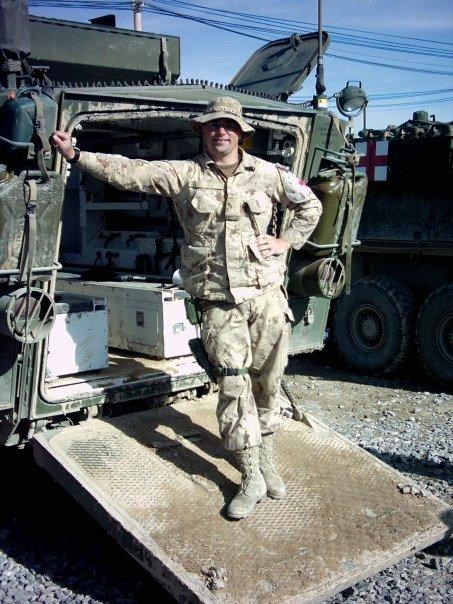We often think about veterans who served in the World Wars, but Canada's servicemen and women have continued to serve in conflict areas around the world.
Cort Barker served overseas in Bosnia in 2000 and 2003 as well as Afghanistan in 2006. Barker began a military life as early as he could, signing up as an 18-year-old in 1999. He grew up in Bienfait and moved back to Estevan following his nearly nine years in the Armed Forces. He is now partnered with Kent Phillips running Performance Pump Service in the Energy City.
Barker's family doesn't have an extended history of military service, but he had a great-grandfather who served in the Second World War, and he said a military life was something he had always wanted to have.
Barker worked five years in armoured reconnaissance, as well as two years as a Leopard tank gunner and loader, completing his service attached to a medic unit in Afghanistan in 2006, retiring as a corporal shortly after his return.
After serving in Bosnia and Afghanistan, he said one of the biggest differences to overcome was the extremes in weather, most prominently the Middle East country's heat.
"It was really hot in Afghanistan. In the summer there, it was 57 degrees," said Barker, noting there weren't really any options to try to keep from sweating through his gear. "You just put up with it. You have 30 kilos of gear on too, (sitting) inside a steel box."
He noted that his time in the military had him acclimatizing to many extremes. Along with the Afghani summers, he spent time in the Arctic completing harsh-winter training.
"We worked with the Rangers and the Inuit up there for a month. I had a great time up there, but I'd never go back there again. We would cut ice off the ice floes and melt it and drink it," he said about the winter survival skills they learned. "We got to go on a seal hunt with the Inuit."
While in Bosnia in 2000 for a NATO mission, he said a lot of his job was relocating people.
"One ethnic group took over an area. They displaced people back to where they came from, and then they left the original people in that area. There was a lot of keeping tabs on the three factions army," Barker said. "We would checklist their inventory and equipment and make sure it was where it was supposed to be."
Near the end of his career in Afghanistan, his job was different, having been teamed up with a medical unit for his eight-month tour.
"In Afghanistan, I dealt more with people, because I'd be the medics' bodyguard or close support, as they would treat people. They would set up lots of aid stations and stuff like that, where they would have to treat the wounded or prisoners, so you'd have to hang around them."
Moving with the unit in an armoured ambulance, he would be part of the team ensuring locations were secure. The unit was embedded right in with an infantry platoon and would be away from Kandahar headquarters for up to a month at a time.
"You would sleep in a ditch you dug or a forward base we had to build because we were the first ones there. Nothing was established other than the base at Kandahar itself," said Barker.
"There were lots of combat missions. There were a few aid stations. There was lots of sitting around."
Overseas deployment for Canadian soldiers is voluntary, and Barker said he was happy to serve in other countries.
"You either go or you stay at home," he said with a laugh. "You wouldn't want to be part of a hockey team and sit on the bench, would you?"
When enlisting in the army, he chose an armoured unit and spent most of his career familiarizing himself with the interior of a Coyote Reconnaissance Vehicle, a light armoured tank. He spent time as a driver and a surveillance operator while operating the Coyote. He also spent time working in Leopard tanks as a gunner and loader. Both vehicles support a crew of four.
He was stationed in Edmonton for his entire career outside of deployment constantly training either physically or brushing up knowledge skills like vehicle recognition.
Domestically, he said he missed most of the natural disasters in which the army was called in to assist, but he was involved in security for the G8 Summit in 2002 when it was located in Kananaskis, Alta.
He was part of the crews in charge of ensuring the meeting locations were secure.
The Coyote he was in is equipped with thermal night vision cameras and radar and day cameras.
"We were just set up, and we would scan the mountainside and make sure nobody got in through the mountain pass."
They had to be watching a couple of weeks prior to the summit as well as some time after.
He decided to exit the military after he and his wife decided they wanted to start a family. He said it wouldn't be fair if he were gone all the time, so decided to make the move back to his home province.
"It's a lot of work and dedication. It's your way of life. It's your living," said Barker.




